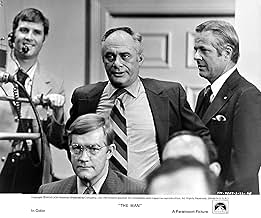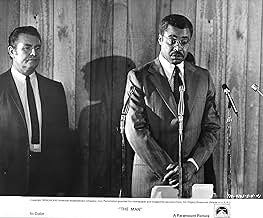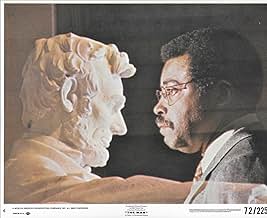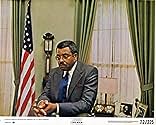African American senator Douglas Dillman becomes designated survivor of a tragic accident that kills the U. S. President. Eventually, Dillman becomes the first black U. S. President and atte... Read allAfrican American senator Douglas Dillman becomes designated survivor of a tragic accident that kills the U. S. President. Eventually, Dillman becomes the first black U. S. President and attempts to end the bigotry standing in his way.African American senator Douglas Dillman becomes designated survivor of a tragic accident that kills the U. S. President. Eventually, Dillman becomes the first black U. S. President and attempts to end the bigotry standing in his way.
- Awards
- 1 nomination total
- Wheeler's Lawyer
- (as Martin Brooks)
Featured reviews
The movie (adapted from the novel by Rod Serling) is quite a contrast. It moves very quickly, almost at a frenetic pace at times. A happy medium between the two might have made for a better movie. The movie is less explicitly racist (especially in its language) and there's no effort at impeachment in this hearing. Instead, the movie's resident racist legislator (played by Burgess Meredith and in the movie a senator) takes the position that Dilman should essentially be left to hang himself politically by being allowed to fuinction as president (which he assumes will happen because he figures Dilman, as a black man, isn't competent enough to be president.) The primary issue here isn't relations with the Soviets but rather relations with apartheid-era South Africa over their requested extradition of a black man accused of an attempted assassination in that country. (Whether in the book or the movie, having the main policy challenge for the first black president focussed on Africa seemed a bit too convenient for pushing forward the racist commentary.) The book leaves it ambiguous whether Dilman will seek the office in his own right in the next election; the movie has him actively seeking his party's nomination.
They both work in their own ways. They're both an interesting reflection on racism in America at the time. The movie has decent performances from its leads - James Earl Jones as Dilman, William Windom as Secretary of State Eaton and Martin Balsam as Chief of Staff Talley, along with the aforementioned Meredith. I would have liked to have seen Windom made better use of. He's an extremely good actor but Serling didn't really develop the tension (and rivalry) between Eaton and Dilman particularly well. (Racism aside the movie also serves as an interesting reflection on a president assuming office who had been elected as neither president nor vice president - which Gerald Ford would do a few years later.)
I thought the most powerful and meaningful scenes were the scenes of Dilman's early presidency, when important discussions are happening in the Oval Office and the Cabinet Room around him, but in which his presence is barely even acknowledged by those present. Jones did a very good job of portraying Dilman's frustration with the dismissiveness Dilman was being treated with.
I liked the novel (although it's a long time since I read it) and I also liked this movie (although I haven't seen it for many years until I happened by accident to find it on You Tube this morning.) I do think it could have been better. Apparently Jones himself expressed some misgivings about it, particularly over the limited budget it had (which does give it a kind of lacklustre feel) and felt it could have been stronger. Still, given the times in which it was made it was a fairly courageous move on the part of ABC, who made it at a time when networks were still very squeamish about tackling controversial social issues and who, interestingly, apparently released it in the theatres instead of on television, although it did end up as a movie of the week on the network. (That's the version I saw on You Tube but I have no idea how long after it was released in the theatre it took to be broadcast on the network.)
The Presidency falls to a surprizing fourth in line.
It's a great story and I don't understand why it isn't on video yet.
The only small flaw is that it is time dated with the premise of Apartied in South Africa. Everyone write to the studio and get them to put it out on video. It has appeared on TV but they cut it to ribbons and destroy the continuity. -ARBY
Enter US Senator Douglass Dillman, who is president pro tempe of the senate. He is also black. He accepts the presidency to the discontent of many cabinet officials, especially the secretary of state. He would be president if not for Dillman.
Racial feelings are revealed among several politicians as Dillman sits in the oval office, determined to overcome the bigotry of those around him and to be as good a president as he can be.
An early vehicle for James Earl Jones, who as Dillman, is brilliant. Excellent performances by the supporting cast. Hopefully, this film will one day be on DVD or VHS. It's also a good potential historical lesson to be absorbed by Americans if this situation should ever happen.
This is only one of several novels written by Irving Wallace that has been transferred to "the big screen." Irving Wallace did NOT like the treatment that THE MAN received in the translation from his written words to the screen. In that I agree.
I have read ALL of his books and found each one to be a "page turner" regardless of how many times I have read them over the years. He was a superb writer and I'm only one of a legion of his fans.
I was very disappointed in the screen adaption of THE MAN. The novel was approximately 800 pages in length and the screen version covered about the first 150 pages. The other 650 pages were lost to Rod Serling's abilities. Very unusual for Serling and I find it very disappointing to say the least.
I agree, this movie should be released on DVD. It's an excellent movie even taking into consideration the "adaption" to the screen. I also happen to be a great fan of James Earl Jones and for that reason alone I think it should be released.
As a side point, every novel written by Wallace had been opted for screen or mini-series treatment. Unfortunately, he died in 1990 and I do recall him saying that as a result of ABC's treatment of THE MAN he would not allow any of his novels to be made into motion pictures unless he was in control of the process. He died - unfortunately. I was so looking forward to the CBS mini-series on his novel THE MIRACLE! If you can find any of his books I highly recommend that you buy and read them. Every one of them was a "page turner" and you won't be disappointed.
Did you know
- TriviaJames Earl Jones was interviewed about portraying a fictional black U.S. president a few days before Barack Obama was sworn in as President. Jones said that he had misgivings about the film, mostly because they were blindsided when the project (which was planned and budgeted as a TV movie) was released in theaters, and he wished that they'd had more time and resources to make a stronger final film.
- Quotes
Douglass Dilman: We live in a time when violence is offered up as the panacea. The bullet seems to be the final instrument of political discourse. Men die violently, we bury them, we mourn for them and we seek retribution. It's a deadly pattern... a quote from Genesis: "Behold the dreamer. Come now therefore and let us slay him and we shall see what has become of his dream." We cannot murder the tyranny by murdering the tyrant and we cannot murder the dream by murdering the dreamer. And if we justify the taking of any life in the name of our morality, we've done nothing but murder our morality.
- ConnectionsFeatured in The Dick Cavett Show: Episode dated 19 July 1972 (1972)
- How long is The Man?Powered by Alexa
Details
- Release date
- Country of origin
- Language
- Also known as
- ザ・マン~大統領の椅子~
- Filming locations
- Production companies
- See more company credits at IMDbPro







































